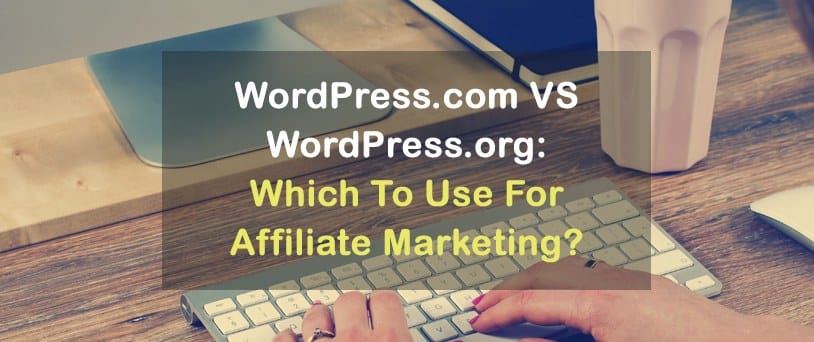Contents

In a world of growth and digital marketing, WordPress has absolutely dominated the CMS (content management software) niche. WordPress provides an easy way to help people create websites and blogs to market their products and services. This platform is especially beneficial for those involved in WordPress affiliate marketing, providing a robust foundation to effectively promote products and services.
It really is one of the greatest levelers of the playing field of our time – small businesses and individuals can have a website just the same as the big guys.
WordPress itself is free and open-source. It's the most popular website management and blogging system on the web, now claiming over 41% market share according data from BuiltWith.com.
But WordPress can be used in two forms: WordPress.com and WordPress.org.
What's the difference for WordPress affiliate marketing?
There's are big differences. And it's important that you understand these differences if you're looking to get into affiliate marketing.
What's The Difference Between WordPress.com And WordPress.org?
WordPress.com is a hosting service, run on WordPress, that provides users with web hosting and a locked-down WordPress environment. The service costs anywhere from nothing to $45 per month.
It's a great tool if you're building a small business site or a personal blog on a very small budget. There are a number of great themes and verified plugins, and the environment, which is managed by the team at Automattic, is very stable.
As mentioned, WordPress.com has WordPress plugins and themes. It also has automatic updates and backups and offers built-in spam protection.
WordPress.org is open-sourced software that is free to any member of the public who'd like to run a website. There are thousands and thousands of themes and plugins in the ecosystem with more added every day.
WordPress.org is often referred to as “self-hosted WordPress” because users are required to buy and set up their own hosting. The cost can be higher than the cost of hosting via WordPress.com, and the set up can be more difficult.
However, many hosts have quick-install options for WordPress sites that make the process much easier to manage. Also, if you get stuck, you can hire a WordPress developer on sites like Upwork and Freelancer.
So, if WordPress.com is the cheaper option, it begs the question…
Is WordPress.com Good For Affiliate Marketing?
Well, to be very blunt and straightforward: no. WordPress.com is not a good idea for an affiliate marketing site or blog. And the reason is simple.
According to WordPress.com itself, affiliate marketing blogs, which are blogs whose main purpose is to drive traffic to affiliate products, are not allowed on the platform.
If you decide to try your luck and set up a blog on WordPress.com with an affiliate link or two, there's a possibility that WordPress will shut down your site. And you won't have the opportunity to reclaim any of your data.
Why WordPress.org Is An Excellent Choice for WordPress Affiliate Marketing
So, now that you know WordPress.com isn't an option, allow us to share with you a few reasons why WordPress.org happens to be an excellent option for WordPress affiliate marketing.
- You get access to tons of plugins that can help you optimize your site for SEO. Yoast and All in One SEO Pack are great examples.
- You can use Google Search Console, a tool that's critical for improving your site's SEO.
- You retain full control of your website. You own it.
- You have access to a massive collection of WordPress plugins/apps (free, paid, and custom).
- You have access to hundreds of free and premium WordPress themes.
- You have the ability to take advantage of powerful tools like Google Analytics for analytics and tracking.
Conclusion
The bottom line is, if you're serious about getting into the affiliate marketing business, you should use the open-sourced version of WordPress, WordPress.org, on your own server.
To get started with WordPress.org and affiliate marketing:
- Buy your own domain
- Get some affordable but reputable web hosting
- Get a good free theme and recommended plugins (such as ThirstyAffiliates)
- If you get stuck, hire a web developer to set it up just the way you want.
Do you have additional questions about the difference between WordPress.com and WordPress.org for WordPress Affiliate Marketing? Ask away in the comments!


Hi, thank you for the good article!
I have recently purchased a domain from GoDaddy.
Because I want to use affiliate links in my website, I haven’t chosen a web host yet.
I have been told that I will need to download Cpanel Web Hosting and then install WordPress on it to install plugins; also that I will need to pay for a web designer to design my website for me with affiliate links.
Is this true? I can’t afford a web designer. What do you recommend. I am a newbie, but a determined one.
I see there are a lot of hosts available. Do they all support affiliate links?
And do you think I will be able to work out how to code the website myself to allow affiliate links?
Thank-you in advance!
GoDaddy have a one-click installer for WordPress, press that. Affiliate links are just like regular links but they have a little bit of extra data on the end so that the merchant can identify who the visitor came from. If the visitor makes a purchase you get the credit.
Hope this helps!
I have to agree, a self hosted version of WordPress is the only way to go in most cases. It offers so much more functionality and as you’ve pointed out, the restrictions set in the terms and conditions can be a problem. That applies to any platform you have zero full control over of course, not just WordPress.com. So it’s worth having your own asset from the outset and use social platforms instead as a medium for traffic following allowable guidelines.